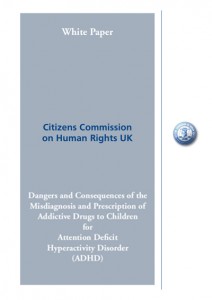A White Paper released by the UK branch of the Citizens Commission on Human Rights (CCHR) highlights a growing problem in the National Health Service (NHS) allowing psychiatrists to target children and adolescents in the pill-popping bonanza eating away at the already strained NHS budget.
Diagnosing children with the so-called psychiatric condition ADHD (Attention Deficit Hyperactivity Disorder), psychiatrists are prescribing drugs similar to cocaine. ADHD drugs are classified as “Central Nervous System stimulants and include drugs such as Ritalin, Adderall and Concerta.
New government statistics released at the beginning of April revealed the number of ADHD drugs prescribed last year in England alone exceeded over 1 million. NHS spending on these drugs in 2012 cost the taxpayer over £52 million, according to the figures published by the government’s Health and Social Care Information Centre (HSCIC). Despite the spending, no physical scientific tests exist to diagnose ADHD as a valid medical condition, children are simply being drugged for their behaviors.
Jim Dobbin, a Member of Parliament, is campaigning on behalf of patients addicted to prescribed tranquilizers, and expressed concern over the effects these drugs are having on children, stating, “CCHR’s White Paper on ADHD raises an issue that is of great concern to society. We cannot keep drugging our children at such an alarming rate without there being serious detrimental consequences for future generations.
“I welcome the Paper which highlights the alarming phenomenon of giving children drugs similar to cocaine as a supposed treatment. We need a great deal more awareness of this issue and CCHR has done well to raise the issue to MPs and the general public.”
CCHR’s White Paper revealed that NICE (National Institute for Health and Care Excellence) guidelines supporting the use of ADHD drugs were based on the recommendations of a Committee whose members had conflicts of interests where almost two thirds of its membership had financial links, personally or professionally, with pharmaceutical companies.



SHARE YOUR STORY/COMMENT